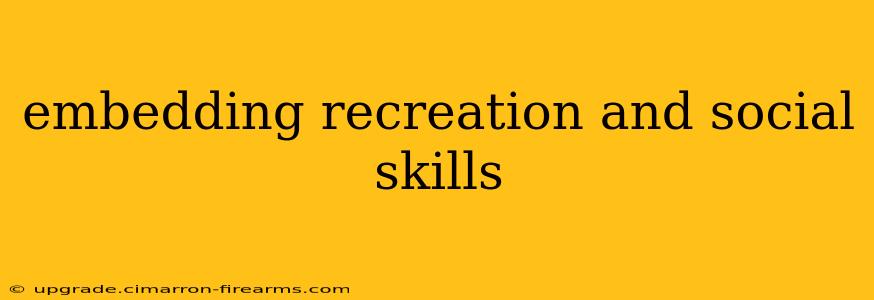Recreation and social skills are fundamental aspects of a well-rounded life, contributing significantly to individual well-being and societal participation. This article explores how to effectively embed these skills into various settings, fostering holistic development and empowering individuals to thrive.
The Intertwined Nature of Recreation and Social Skills
Recreation and social skills are deeply interconnected. Engaging in recreational activities often necessitates interacting with others, requiring collaboration, communication, and negotiation. Conversely, strong social skills enhance the enjoyment and effectiveness of recreational pursuits. A child learning to share toys during playtime is simultaneously developing both recreational engagement and social competence. An adult joining a hiking group not only enjoys physical activity but also builds relationships and expands their social network.
Key Benefits of Embedding Recreation and Social Skills:
- Improved Mental and Physical Health: Recreational activities promote physical fitness and reduce stress, while strong social connections combat loneliness and improve mental health.
- Enhanced Self-Esteem and Confidence: Mastering new skills and successfully interacting with others boosts self-esteem and fosters confidence.
- Increased Independence and Autonomy: Participating in recreational activities and navigating social situations cultivates independence and self-reliance.
- Greater Social Inclusion and Community Participation: Strong social skills facilitate integration into communities and build supportive relationships.
- Improved Academic and Professional Success: Positive social interactions and stress management techniques learned through recreation can positively impact academic performance and career prospects.
Embedding Recreation and Social Skills in Different Settings:
1. Educational Settings:
Early Childhood: Play-based learning is crucial. Structured games and free play encourage social interaction, sharing, and conflict resolution. Outdoor activities promote physical activity and exploration.
Schools: Integrate recreational activities into the curriculum through physical education, arts programs, and extracurricular clubs. Encourage teamwork and collaborative projects to foster social skills. Provide opportunities for social interaction during breaks and lunchtimes.
2. Community Settings:
Community Centers: Offer a wide range of recreational programs catering to diverse interests and age groups. Facilitate social interaction through group activities, workshops, and community events.
Parks and Recreation Departments: Provide access to parks, playgrounds, sports fields, and other recreational facilities. Organize community events and sports leagues to promote physical activity and social interaction.
3. Therapeutic Settings:
Rehabilitation Centers: Utilize recreational therapy to improve physical function, cognitive skills, and social interaction. Tailor activities to individual needs and abilities.
Mental Health Services: Incorporate recreational activities into treatment plans to reduce stress, improve mood, and build social connections. Group therapy sessions focusing on social skills can be highly beneficial.
Strategies for Effective Embedding:
- Create a Supportive and Inclusive Environment: Foster a sense of belonging and acceptance, encouraging participation from all individuals.
- Provide Opportunities for Choice and Self-Expression: Allow individuals to select activities that align with their interests and preferences.
- Offer Gradual Skill Development: Introduce new skills progressively, providing support and positive reinforcement.
- Use Positive Reinforcement and Feedback: Celebrate successes and provide constructive feedback to encourage improvement.
- Promote Collaboration and Teamwork: Design activities that require collaboration and communication, fostering teamwork skills.
- Address Social Challenges Directly: Provide guidance and support in navigating social situations, teaching conflict resolution and communication strategies.
Conclusion:
Embedding recreation and social skills effectively requires a holistic and multifaceted approach, integrating these skills across various settings and utilizing tailored strategies. By fostering a supportive environment and providing ample opportunities for engagement, we can empower individuals to develop crucial life skills, leading to improved well-being, enhanced social connections, and a greater sense of fulfillment. The benefits extend far beyond leisure, impacting overall development and contributing to a more inclusive and thriving society.

